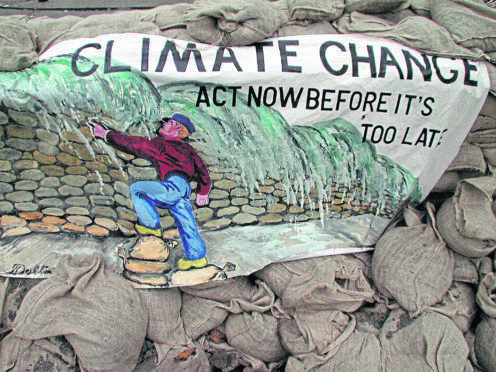We have only twelve short years to avoid a catastrophe across our planet – less than the time taken for a child to complete school.
The UN’s Intergovernmental Panel on Climate Change is predicting catastrophe if global warming goes above 1.5 degrees. Current plans to cut greenhouse gases must increase five fold in order to keep the temperature rise below that level.
If not, as Sir David Attenborough told the climate change conference in Poland: “Right now, we are facing a man-made disaster on a global scale. Our greatest threat in thousands of years. If we don’t take action,the collapse of our civilisations and the extinction of the natural world is on the horizon”.
A powerful warning.
The World Meteorological Organisation have warned that the past four years have been the hottest on record.
We are not personally witnessing the melting glaciers but in the Highlands and Islands we are seeing obvious changes. The increased frequency of storms as well as intense rainfall causing flooding and landslides are among them.
Those islanders already dependent upon a depressingly poor and unreliable ferry service from CalMac can only expect this service to deteriorate further as storms become more intense, frequent and persistent due to dramatic changes in the wind systems over the North Atlantic. Our prevailing winds have always been from the West but experienced CalMac skippers say that they are now encountering far more winds from the South and North.
Our ports and harbours across the North have been built to protect ships from westerly gales. Costly new breakwaters will be required in many locations.
Yet, as far as I have seen reported, not a word about the need for action on this critical issue at any of the recent party conferences.
Meanwhile, the Tory Government commits its schizophrenic internecine war over Brexit whilst HM Opposition remain impotent.
We need urgent united action across the world.
The World Bank has announced $200 billion in funding over five years to support countries taking action against climate change, which is a start.
Perhaps the devastating hurricanes, storms and wildfires which are increasingly prevalent in the USA, will persuade their president to believe that climate change is for real.
We need a fundamental change in attitudes and policies to power generation, industry,transport, buildings and lifestyles, with financial support.
The use of coal,oil and gas to heat homes has to be phased out to be replaced by heat pumps and solar panels, with wind and hydro schemes for rural and island communities.
Existing houses need to have the maximum attic and wall insulation retro-fitted. New homes should be passive houses which are designed to require no heating, these are already being built.
Fuel poverty is at its worst in the island and rural communities so these schemes must be fully funded. After all, the hydro schemes built by developers and estates receive a return of 12-40% on their investments with additional tax benefits.
We have to support current off shore wind farms, such as those under construction in the Outer Moray Firth.
Research needs to be accelerated for tidal and wave renewables which, in time, will replace all onshore wind turbines as our main source of renewable energy.
We need to leave most of the remaining oil and gas in the North Sea whilst using the expertise and skills in Aberdeen, the north-east and the Northern Isles to produce the engineering changes we need to move to a zero carbon society.
So, no more tax breaks for the North Sea oil industry.
We have to phase out petrol and diesel vehicles. This can be easily achieved in the cities with electric cars and regular public transport. In rural areas, with little or no public transport, a car is essential.
For a family, with two working adults, two cars are essential- and most of us drive diesel cars as they are cheaper to run and last longer. A key reason why it costs a family 40% more to live in a rural area.
If Scotland wants our rural areas to be inhabited by working people it needs to provide incentives to buy and run hybrid or electric vehicles which are capable of a round trip of several hundred miles. A great local initiative is the successful scheme in Orkney with free charging.
Planting more trees will help, both commercial and native. I would like to see an expansion of integrated woodland proposals, whereby the native woods, once established, are open to sheep and cattle for shelter and improved grazings.
Greater recycling rates are needed. The Highland Council are considering transporting waste to land fill in England because of a lack of capacity. Landfill is both costly and unnecessary as we should be capable of increasing our household recycling rate from 60% to 80%. A start would be to allow small contractors to use the council’s recycling centres to avoid dumping or burning their waste.
A range of measures are very urgently required on an individual,national and international level.
We only have one planet and we must rescue it.
Michael Foxley is a former leader of Highland Council and a retired GP

